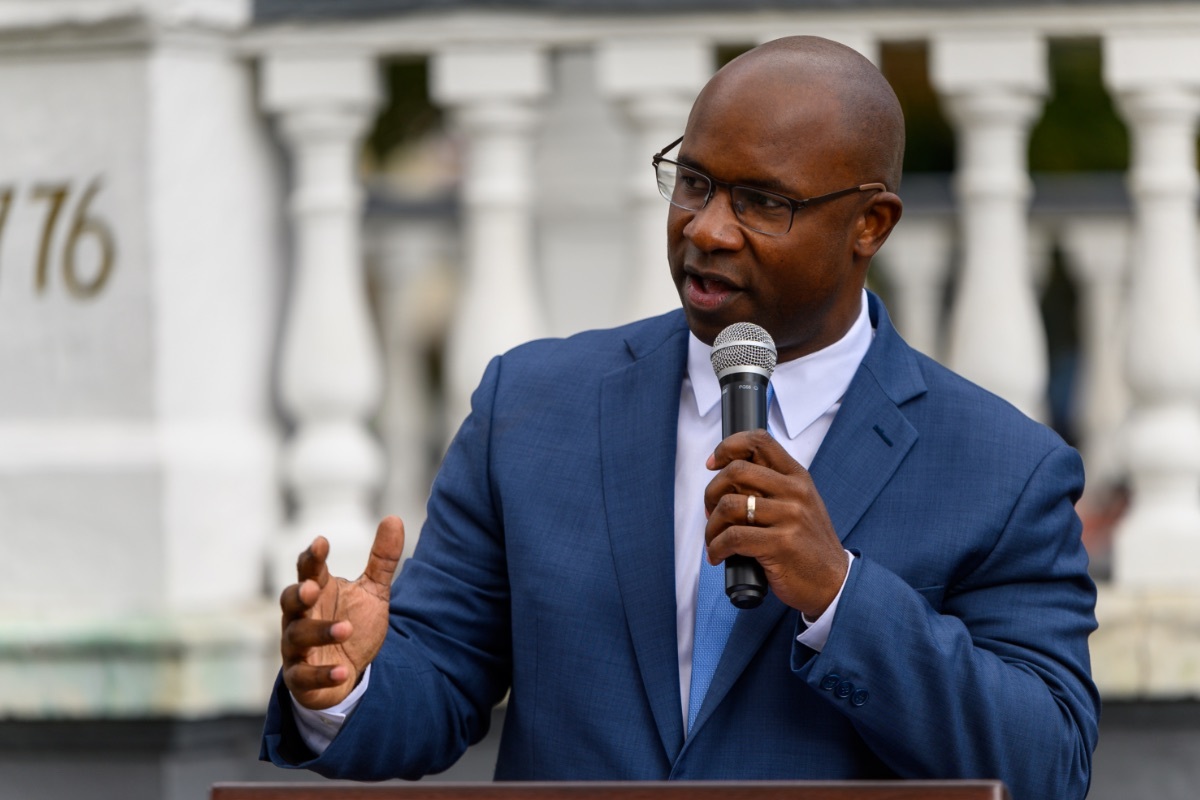Augustine Rubit is the reigning Sun Belt Conference Player of the Year. He was also named an honorable-mention All-American last season. The University of South Alabama’s 6-foot-7 senior forward is one of the best college basketball players in America.
But unless you’re a college basketball coach, follow the Sun Belt, or a fan of the South Alabama Jaguars, you’ve probably never heard of him. Once you examine his story, though, chances are that you’ll never forget him.
This is the first installment of our four-part series on him.
1st QUARTER
DESPAIR
As he sprinted through the grass field, the velocity of the bullets that were whizzing in his direction was no match for the speed of his racing heart. Augustine Rubit wasn’t a star basketball player with a shot at the N.B.A. back then. He was just an impressionable, reticent 11-year-old kid, a sixth grade dropout, following behind a group of teenage knuckleheads who specialized in smoking weed, selling drugs and breaking into people’s homes, stealing anything they could jump out of a window with.
The rough Northwest Houston ghetto that he grew up in held few assurances for kids like Rubit. But he was guaranteed one thing: that he’d be swallowed up, dead or alive, if he kept on the path that he’d been walking. He knew about guns. He’d seen people get jumped and beaten up badly. But this time was different. Now, the violence was targeted at him.
He could see them, the men who his friends had just robbed, shooting their weapons out of the window of their speeding sports utility vehicle. He ran as fast and as far as his spry legs could carry him, hoping to outrun the bullets and his circumstances. He didn’t yet know what he wanted out of life. But he knew that this wasn’t it.
“I was scared to death,” said Rubit. “I was shaking. My heart was beating so fast. Those guys could have possibly killed me. I got away with stuff back then because I was young. I saw things that frightened me. And I didn’t want to do it anymore. There was stuff that I just didn’t want to experience anymore.”
Rubit’s job amongst the burglary crew was to be the lookout. When they broke into a house, he’d sit outside, across the street, ready to give the signal to bail in case danger approached. On this day, when the men drove up to the house that his friends were inside ransacking, looking for cash, jewelry, or anything else of value, Augustine calmly stood up and began walking, loudly hooting a phonetically haphazard owl call – “WU WOOOT! WU WOOOT!”
When the residents of the home looked at him sauntering away and heard his signal, they dashed into the house. Moments later, they came out, guns in hand, looking to exact revenge. Rubit scurried to safety on that afternoon, but hanging out with his neighborhood crew had him figuratively galloping towards certain peril.
“The guys I was with, they made it out of the house with some things they’d stolen,” said Rubit. “They told me that I did a good job. But that incident, for me, was like that TV show, Scared Straight,” he recounted in a monotone, gentle cadence, chuckling softly at the frightening recollection.

There were other terrifying moments, like the time his so-called buddies left him inside of a drug house, instructing him to sell some packages.
“One time, I was supposed to be selling the drugs, and some older guys, they were about 20 years old or so, they showed up to buy some stuff,” said Rubit. “And they just took it from me. I knew that the guy that I was working for was going to be pissed off. I’d lost his money. But what could I do. I’d seen people get hurt for less. I knew that if I was going to do stuff like that, I was going to have to be prepared for the consequences.”
Luckily, because he was so young, he was given a pass. But that wouldn’t continue once he got a little older. At some point, he was either going to made an example of, or he’d be forced to hurt someone else in order to solidify and enhance his own reputation and street credibility. That’s the law of the perilous, treacherous street life, espoused long ago by Charles Darwin in his evolutionary theory of natural selection: Survival of the Fittest. Kill or be killed. Eat or be eaten.
In reality, Augustine was a sweet, gentle child. Believe it or not, his decision to leave school at such an early age was altruistically motivated. From his perspective, it was the best move for his struggling family, which, at the time, was being held together by nothing more than rubber bands, duct tape and an abundance of love. More on that later.
He knew what he was doing in the streets was wrong. But for most of his young life, he was enveloped by the absurd senselessness and burdens of the pitiable decisions of others that pulled his life out of the orbit of normalcy. His reality was not of the white-picket-fence variety. Through the turmoil, his inner voice begged for something better. And his 18-year-old sister, Lorraine, demanded it.
A TURBULENT CHILDHOOD
As a young child, Rubit’s mother, Kimberly, walked in and out of his life. Her own mother was murdered at the age of 22, when she was just a mere toddler. Kimberly was caught in the throes of a debilitating drug addiction during Augustine’s childhood, straddling a merry-go-round of days and weeks on the street and months and years of incarceration, returning home sporadically to promise that everything was going to get better. But it rarely did.
When things did improve, it wasn’t for long. After short stints, where his mom would get things together and gather her kids from their Child Protective Services placements, she’d eventually vanish back into the abyss of the chemical plague.
“There were a lot of situations with my mom going back and forth to jail, and me and my siblings moving in and out with my grandparents and godmother,” said Rubit. “I loved my mom, and was happy to see her when I did have a chance to. When I was young, I was just living day by day. I didn’t have any other concept of what a family was, or what a healthy home environment looked like. To me, what we went through was normal.”
When he was 11 years old, his mom disappeared again for an extended period of time. His oldest sister, Lorraine, was 18 years old at the time and determined to hold things together. She embraced the ‘Mother’ role and strove to provide a stable home environment for her four siblings, which included her twin sister Mary, who suffers from Cerebral Palsy.
“My grandparents basically raised me and taught me that the most important thing in the world is family, no matter what was going on.” said Lorraine. “We lived in a one-bedroom apartment: me, my brothers and sisters, my son, and I was also pregnant at the time, expecting another child. For me, it was worth it because I wanted to make sure that they were somewhere safe, that they weren’t being mistreated, that they were getting the things that they needed. I loved them to death. Since I was the oldest, I decided that I was going to do whatever I had to do to take care of them.”
Lorraine did an admirable job, given the circumstances. When workers from Child Protective Services would stop by the home, it was clean. They could smell the aromas of food cooking in the kitchen. “My Mom’s not here right now,” Lorraine would tell them, trying to stay one step ahead of her family being fractured even further.
But she worried about the baby, her 11-year-old brother/son, whose reserved and quiet nature sometimes troubled her. He was too tranquil, his eyes too distant at times. She knew that the neighborhood was a tough one, and with mouths to feed, a sister with a disability, clothes to wash and bills to pay, her eyes were often drawn to the little brother, Augustine, wondering if she could give him all that he needed.
The family was living in the Lincoln Park apartment complex in Houston’s Acres Home neighborhood. In the early 1900’s, when Houston landowners began selling home sites in the area that was spacious enough for residents to grow fruits and vegetables in their own gardens, dig their own water wells, build their own homes and raise their own farm animals and livestock, the area was a Utopia for African-Americans. But the appeal of Home Acres disintegrated by the 1970’s. During Augustine’s childhood, it was notorious for its high rates of crime, drugs and violence.
“The environment I was living in at the time was not a good situation for him,” said Lorraine. “He was never a person that brought chaos and problems into the house. I wanted him to be in school, not getting in trouble. I didn’t want him to become a statistic.”
Augustine would come into the house at late hours back then, and wouldn’t communicate much. Things started going downhill when he decided to stop attending school.
“I had already been to a bunch of elementary schools because we moved around so much,” said Augustine. “My sixth grade year, when we were all living with my sister, I had to take public transportation to get to school. I’d always get there late, and once the school started asking questions, saying that they wanted to see my guardian, I knew that it was only a matter of time before C.P.S. got involved again, splitting us up. There was no way, that when they found out that my sister was taking care of us, that they were going to allow that. So I just decided to stop going. I didn’t want to lose my family.”

“He would get up in the morning and have to take public transportation to school,” said Lorraine. “Sometimes he’d get there on time, most of the times he got there late. And sometimes he wouldn’t get there at all because there wasn’t always money for him to catch the bus. He came from a situation where Child Protective Services was in our life, and he didn’t want to go back to that. I wasn’t his legal guardian and I didn’t have social security cards and birth certificates. He knew, at some point, with all of the questions they were asking, they were going to find out about our mom.”
At Christmas, although she couldn’t afford to purchase gifts for her siblings, Lorraine did what she could, penning letters to each of them. “I know our situation is not good right now,” she wrote to Augustine, “but eventually, one day, if you continue to do right and focus and work hard, no matter what, it will all pay off.”
Augustine eventually confided in his older sister, telling her that he wasn’t going back to school, and why. She didn’t want the family to be split apart again either, but she couldn’t sit by and have her brother be a sixth grade dropout. So she made the hardest decision of her young life.
“One day, I was just sitting there looking at him, looking at my situation,” said Lorraine. “I could do it, in terms of taking care of him, but I couldn’t make sure that he got the education that he needed. He was never a bad kid, never disrespectful, he never asked for much and he was always grateful for what he had and what we could do for him. But I knew that he needed to be in a better environment.”
Lorraine, through heartache, called a family friend, a lady named Doris Brown, asking if she could take care of Augustine and his sister Ashanti. Brown had filled in some gaps over the years, taking in some of the Rubit kids for long stretches during some of the family’s more jagged times. Lorraine agonized over the decision, but wanted to do right by her younger brother and sister.
“It was really hard to send them to live with Ms. Doris,” said Lorraine. “She took care of my other brother Mitchell when he was a baby. Augustine and Ashanti lived with her when they were younger, during a period when C.P.S. decided to place us out of the home. There was a history there. Doris was like another mom to us. Their grades were never a problem, but they’d missed so much school. I didn’t want them to feel like I was pushing them away. I wanted them to get an education, to have more than I was capable of giving them at the time.”
As the final bag was placed in Ms. Doris’ trunk on the day that she came to pick up the kids, as the heavy car door slammed and her little brother and sister drove off, their penetrating eyes locked onto her as she shrunk in the distance, Lorraine put on a brave face, smiling and waving. As she turned around to walk up the stairs to her apartment, a torrent of tears spilled down her cheeks.
“I cried like a baby,” said Lorraine. “I cried because I loved them so much and I was going to miss them. It hit me that I wouldn’t be able to wake up and see them, I wouldn’t be able to hear their voices, I wouldn’t be able to sit down and joke and laugh and play with them every day like I wanted to. I knew it was for the best, but that didn’t stop the pain.”
There was more structure at Ms. Brown’s house. Augustine, away from the negative peer influences, was able to repeat the 6th grade and avoid any further brushes with trouble. But the new neighborhood was not a huge improvement from what he’d left behind.
“The middle school I went to was a troubled school in a bad area,” said Augustine. “But once I moved in with Ms. Doris, I stopped hanging around with kids that were heading towards trouble.”
To be continued…
2nd Quarter – Part II of From Despair To A Dream: The Augustine Rubit Story
3rd Quarter – Part III of From Despair To A Dream: The Augustine Rubit Story
4th Quarter – Part IV of From Despair To A Dream: The Augustine Rubit Story



